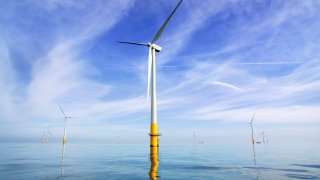
- Europe is a major player in offshore wind power, with a number of significant projects planned for the next few years.
- The U.S. still lags behind Europe, but a number of states are looking to ramp up their capacity in the near to mid term.
The European offshore wind sector attracted over 26 billion euros (around $31.7 billion) of investment last year, a record amount, according to the latest figures from industry body WindEurope.
In an announcement Monday, the Brussels-based organization said the cash raised will finance a total of 7.1 gigawatts (GW) of offshore wind capacity, with projects set to be developed and built over the next few years. Capacity refers to the maximum amount that installations can produce, not necessarily what they are currently generating.
Last year saw 2.9 GW of offshore wind capacity installed, a 20% drop compared to 2019 but a number WindEurope still described as being "in line" with its pre-Covid 19 forecast.
Get top local stories in Philly delivered to you every morning. Sign up for NBC Philadelphia's News Headlines newsletter.
Europe's offshore wind capacity now stands at a little over 25 GW, with 42% of this located in U.K. waters. Long term, the European Union, which the U.K. left in January 2020, is targeting 300 GW of offshore wind by the middle of this century. U.K. authorities want their offshore wind capacity to hit 40 GW by the year 2030.
Giles Dickson, WindEurope's CEO, said in a statement Monday that the investment figures from last year represented a "huge vote of confidence in offshore wind."
Dickson went on to add that the installation figures for 2020 — a year in which many firms in the sector faced disruption due to the coronavirus pandemic — showed the offshore wind sector's resilience.
"Europe's existing offshore wind farms kept operating," he said. "We kept building new wind farms. We kept making new turbines."
Europe is a major player in offshore wind power. The world's first offshore wind farm, in waters near the Danish island of Lolland, was commissioned in 1991.
Money Report
Looking to the future, major projects planned for European waters include the Dogger Bank Wind Farm, which will have a total capacity of 3.6 GW, and the 3.1 GW East Anglia Hub. These developments will be located off the northeast and east coast of England, respectively.
When it comes to offshore wind, the U.S. still lags behind Europe. The first offshore wind farm in the country, the 30 megawatt, five turbine Block Island Wind Farm, only started commercial operations at the end of 2016.
Change is on the horizon, however, with a number of states now aiming to ramp up their offshore wind capacity in the near to mid-term. These include New York, which is targeting 9 GW by 2035; New Jersey, where authorities are aiming for 7.5 GW by 2035; and Virginia, which wants to have 5.2 GW by 2034.
Significant projects planned waters off the East Coast include the Empire Wind and Beacon Wind developments, which are backed by oil and gas giants Equinor and BP.






